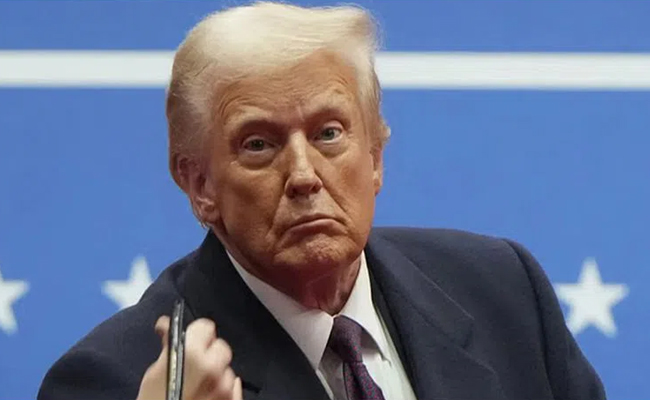
World

He warned us in advance. Donald Trump made several bold claims about what things would be like if he returned as U.S. President. So, if things seem chaotic now, perhaps it should all be seen as a predicted political tsunami.
Even in places as far-flung as Amalapuram, people are now discussing U.S. tariffs. Economists have made it clear that Trump’s high import duties are pushing the American economy towards a possible recession. And this isn’t just an American issue — experts strongly believe it will have consequences for India too.
Ironically, some right-wing supporters in India even performed rituals praying for Trump’s re-election. But now, those same wishes might backfire, especially for Indian IT professionals whose job opportunities heavily rely on the U.S. market.
So the real question arises — is Trump doing all of this knowingly?
Trump is notorious for claiming that he knows more than anyone else on any topic — whether it's foreign policy, economics, or climate change. Social media is full of videos where he boldly declares that no one knows a subject better than he does, only to be trolled by netizens using his own clips.
But we must recognize that leaders like Trump — extreme nationalists — don't necessarily act based on ignorance. Rather, they act based on what pleases their core supporters. What fires up their base is what they pursue. The fallout? That’s the public’s problem.
Take India, for example. When PM Modi announced demonetization in the middle of the night, supporters hailed it as a "masterstroke." And indeed it was — a stroke that hit the common man hard. People who earned Rs 100–Rs 200 a day suffered immensely. Meanwhile, billionaires remained unaffected. Their businesses went on as usual. Despite lofty claims, black money was never eradicated. Yet the nationalists celebrated.
Trump’s decisions seem to follow the same pattern. His reckless policy shifts may collapse the entire American economy. He has already pulled back foreign aid that the U.S. used to offer — aid that once gave America its global leadership status. Now, that’s gone. And there are already voices in the U.S. saying that the average American hasn't gained anything from these policies. In fact, some are struggling to even afford eggs, as signboards and protest placards indicate soaring egg prices.
The import tariff story is no different. American businesses rely heavily on imports — it’s a strategic decision, not laziness. Many U.S. companies have built their entire supply chains based on global sourcing. Disrupting that foundation may cause these business giants to crumble.
Trump’s solution? “Stop relying on imports. Make everything in America.” But the reality is — that’s not feasible. These companies are dependent on imports for a reason. Their success is built on this model. Trump, who claims to know more than anyone about everything, surely understands this. But still, he moves ahead — because what matters to him is not economic sense, but emotional appeal. Keeping his hardcore nationalist supporters satisfied is the true goal.
That’s the mark of extreme nationalist leadership: dividing people, pushing emotional agendas over practical solutions, and ignoring real issues that impact common citizens.
The irony? The world seems to be backing such leaders more than ever before. But it’s only after the damage is done — after the "knife" sinks in — that people begin to feel the pain. And in today’s climate, even that pain seems to be worn as a badge of loyalty by extreme nationalist followers.
Advertisment